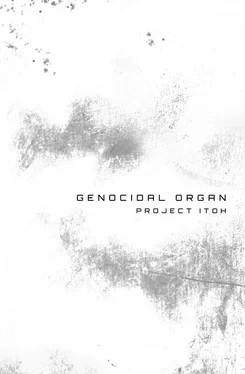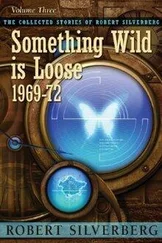Project Itoh - Genocidal Organ
Здесь есть возможность читать онлайн «Project Itoh - Genocidal Organ» весь текст электронной книги совершенно бесплатно (целиком полную версию без сокращений). В некоторых случаях можно слушать аудио, скачать через торрент в формате fb2 и присутствует краткое содержание. Год выпуска: 2012, ISBN: 2012, Издательство: Haikasoru/VIZ Media, Жанр: Старинная литература, на английском языке. Описание произведения, (предисловие) а так же отзывы посетителей доступны на портале библиотеки ЛибКат.
- Название:Genocidal Organ
- Автор:
- Издательство:Haikasoru/VIZ Media
- Жанр:
- Год:2012
- ISBN:9781421550886
- Рейтинг книги:4 / 5. Голосов: 1
-
Избранное:Добавить в избранное
- Отзывы:
-
Ваша оценка:
- 80
- 1
- 2
- 3
- 4
- 5
Genocidal Organ: краткое содержание, описание и аннотация
Предлагаем к чтению аннотацию, описание, краткое содержание или предисловие (зависит от того, что написал сам автор книги «Genocidal Organ»). Если вы не нашли необходимую информацию о книге — напишите в комментариях, мы постараемся отыскать её.
Genocidal Organ — читать онлайн бесплатно полную книгу (весь текст) целиком
Ниже представлен текст книги, разбитый по страницам. Система сохранения места последней прочитанной страницы, позволяет с удобством читать онлайн бесплатно книгу «Genocidal Organ», без необходимости каждый раз заново искать на чём Вы остановились. Поставьте закладку, и сможете в любой момент перейти на страницу, на которой закончили чтение.
Интервал:
Закладка:
“It’ll be no time at all to our destination in this baby, sir,” said Alex. “I wonder what’s written on the side of this pickup, though?”
“It’s Japanese,” I answered. I’d minored in the language back in college, and as a result I’d once been assigned to train up a section of their army. What was it called? Ji-eh-tai or something. … Anyway, the lettering on the side of the truck seemed to suggest that it had once been used by a tofu shop called Fujiwara. Would a Japanese tofu shop ever have imagined that their old, beat-up vehicle would have a new lease on life as a makeshift armored vehicle in a civil war in the boondocks of Eastern Europe?
“They’re called kanji , aren’t they, the letters, sir? Pretty cool language,” Alex said.
“Sure, when you can’t read them they’re more like a work of art than lettering, I suppose.”
“So you’re saying that they seem cool only because I can’t read them?”
“You could say that, yeah,” I said. “In the same way that it’s easy to reject a foreign culture you don’t understand, you can also end up putting it on a pedestal. Using words such as ‘exotic’ and ‘oriental’ to describe something as being cool, when really all you are talking about is a cultural code for some sort of ‘other’ compared to what you’re used to.”
“I think I understand,” said Alex. “So a foreign language isn’t just another language, it’s also foreign , is that what you mean, sir? More like a pattern or motif on a textile rather than language as we know it?”
“Something like that. Semantic bleaching, that’s what they call it when words lose their meaning—although I suppose it’s a little different if the words never had any meaning to you in the first place. Imagine a Scrabble board when the game’s being played in a language you don’t know. The whole board is just going to look like an abstract work of art to you, isn’t it?”
We often played Scrabble back at base. Many a long afternoon was made shorter by the spell that magical fifteen-by-fifteen grid cast on us as it filled up with words. Williams, for example, was constantly pestering me to play just one more game. He always lost. And he always went into a snit afterward. His regular lament went something like this:
“Okay. So they say the average American knows forty-five thousand words. Forty-five thousand! So why can’t I even think of enough words to fill a pissant board fifteen squares wide?”
Incidentally, the highest-scoring word ever sanctioned in Scrabble once came up in a game between Williams and me. I was the one who played it, of course. Quixotry , derived from an old Spanish novel. A furious Williams refused to accept it until it had been double-checked in two different dictionaries. Whether because he genuinely didn’t believe it or just didn’t want to concede the ridiculous score it gave me—365 points on that single word, was it?—I don’t know.
I’ve never lost a game of Scrabble in my life. Not ever, since my first-ever game against my mother when I was eight years old.
Looks like I’ve brought up a right little philologist. You and words are just made for each other. I remember my mother saying this to me when I was a teenager. I hadn’t thought about it in those terms before, but it was certainly true that I always had a certain affinity for words. I remember thinking it was both strange and hilarious that a few little words could change a person so completely. People could become enraged by words or brought to tears, or have their emotions buffeted this way and that. Words were so interesting .
I never saw words as a mere means of communication. What I mean by that is that I didn’t just “see” words, but I also felt them, viscerally, their weight pressing down on me as if they were matter. To me, words didn’t just connect people, words bound people, restricting and regulating their actions in very real and meaningful ways, even if the people using the words were completely oblivious to this fact. I sensed this, just as a mathematician could conceptualize and grasp an imaginary number as clearly as a real one. They say that physicists don’t think in terms of words, and that Einstein didn’t arrive at his Theory of Relativity just by stringing together words and formulae. Rather, it all just came together in a much simpler place, a primeval space, outside the scope of human language and number systems.
I can sort of relate to this. I perceive words as a sort of landscape. It’s hard to explain the feeling to other people. After all, it relates, in a most fundamental way, to how I perceive the world around me. And what people perceive as “real” varies from person to person, mind to mind. The ancient Romans never debated the meaning of taste or color, for example.
Just as I can conceptualize words, there are people who can conceptualize and relate to abstract concepts such as “nationhood” and “race.” I could no longer do this myself, probably because I was jaded by a job that essentially came down to killing people for the sake of this very same “nation.” Maybe the words were just too overwhelmingly powerful for me, who knows? All I knew was that words such as nationhood , race, and community were just that, as far as I was concerned—words. And even if I could conceptualize them as words, they weren’t concepts that I could relate to my real, everyday existence.
A corollary to this was that people who did have their own vivid, holistic idea of what a word like nationhood meant could do my thinking for me. These people would be part of the establishment, Langley or Fort Mead or Washington, thinking hard about what nationhood meant and ordering me to kill people on its behalf.
I’m sure that the same went for the leaders of the various insurgencies in the country that we were now in. They had the ability to perceive that “their country” and “other countries” were distinct entities, and this enabled them to act accordingly. After all, if you couldn’t draw a line between “us” and “them,” how could you label anyone the “enemy”? Oh, sure, it was easy enough when someone was physically in front of you, threatening violence, a clear and present danger. But to demarcate clear boundaries along the lines of race or religion, and moreover to label anyone on the wrong side of the “us and them” divide as enemies worthy of being killed? That took some serious willpower, or at least a concerted effort to conceptualize “reality” in a very specific way.
After all, no conflict, anywhere, ever, started by both sides saying “Well, we have our own version of events and they have theirs, and to each their own!”
There was no Holocaust. The lunar landings were faked. Elvis is alive and kicking and runs a thriving little diner in the Yukon.
The very fact that blatant untruths such as these could even be seriously posited was proof, if ever it was needed, that there was no such thing as an objective “history” that the world accepted. And wasn’t it that prophet of postmodernism, Baudrillard, who said that the Gulf War never actually took place?
History is written by the victors, of course, but there’s more to it than that.
History is an arena of discourse, and discourse is nothing if not subjective. So, while it’s certainly true that the victors have more chance of having their views heard, there are still plenty of nooks and crannies and crevices for the vanquished, the weak, and the marginal to slip in their versions of events. History may have been written by the victors, but it wasn’t always the victory in the battlefield that mattered more than the victory in discourse.
Читать дальшеИнтервал:
Закладка:
Похожие книги на «Genocidal Organ»
Представляем Вашему вниманию похожие книги на «Genocidal Organ» списком для выбора. Мы отобрали схожую по названию и смыслу литературу в надежде предоставить читателям больше вариантов отыскать новые, интересные, ещё непрочитанные произведения.
Обсуждение, отзывы о книге «Genocidal Organ» и просто собственные мнения читателей. Оставьте ваши комментарии, напишите, что Вы думаете о произведении, его смысле или главных героях. Укажите что конкретно понравилось, а что нет, и почему Вы так считаете.












